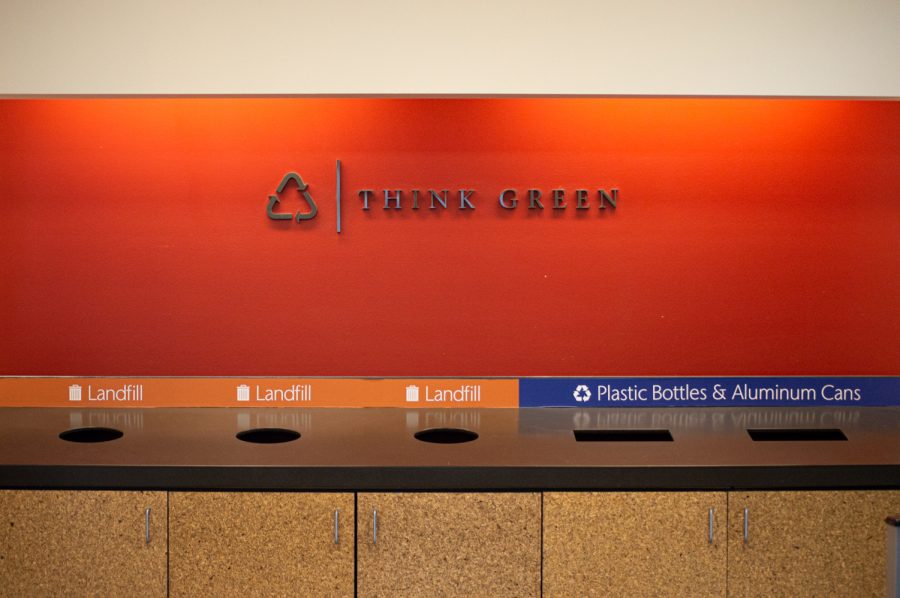Cougs must act for environment
WSU fairly sustainable, but students can do more
This sectioned bin, located in the Compton Union Building, is one of many on campus. Students can place recyclables as well as grabage in these bins to help keep our campus clean.
September 27, 2021
Plastic waste is a major issue for our environment. Every year, we produce over 300 million tons of plastic. For reference, that is equivalent to one billion elephants.
Is that not crazy? Plastic is the most common material seen and used when we go to the store, eat fast food or purchase something online. Almost everything we do incorporates plastic somehow.
“I see why everyone uses plastics. They are incredibly cheap and easy to mass-produce. But the first step we can take [to increase our personal sustainability] is to reduce and hold ourselves accountable for our plastic use,” Jesse Brazil, senior sociology major, said.
Brazil is the WSU Environmental Sustainability Alliance treasurer, an ASWSU committee partaking in some of the Green Fund to carry on ideas to make our university more sustainable.
The Green Fund provides students and faculty an opportunity to submit research proposals and come up with sustainability options that better the WSU campus. They have made it possible for us to have solar panels near the Chinook and plastic compressors around campus.
At WSU, we use so much plastic around campus but have the opportunity to dispose of it in the correct areas. Near almost every trash can, there is a recycling container, but students actually throw the plastic away most of the time.
There are some complications to the idea that recycling is quick and easy, though, so I understand some of the hesitancy.
If there is food waste on an otherwise recyclable piece of trash, you should actually not recycle it. By that point, it would be safer to throw it away; manufacturers reject the plastic that is contaminated by food waste.
It can be hard to remember rules like this, but considering how much plastic we use daily, it still needs to become a habit.
Plastic is not the only concern for harming our ecosystem. Since the pandemic, disposable masks have done a lot of damage to wildlife.
Allyson King, associate professor in WSU’s School of the Environment, spreads awareness to students interested in being sustainable.
“Be aware that these masks can entangle wildlife really easily,” King said. “If they get into waterways, animals [can] get tangled up in them.”
A great way to recycle in this situation is to consider getting a reusable mask. I prefer reusable masks because I can wash them every week. They are more comfortable and, of course, are environmentally friendly.
Everyone can take steps to be cautious about the amount of plastic waste you create. Purchasing reusable items over disposable ones can make a huge difference.
For Cougs, the easiest way to support sustainability at WSU is by contributing to the Green Fund.
When registering for classes, there is a box to check for the Green Fund right next to our Sports Pass box. It only costs $5 per semester to help the environmental cause.
“I’ve yet to hear someone complain about the Green Fund,” Brazil said. “I bet people would be willing to donate more.”
The Green Fund allows students who do not want to actively participate in ESA to help the cause simply by checking a box.
There is a stigma that one person cannot make a difference, whether it be in the fight for the environment or anything else. This statement is false. As individuals, we can make a huge difference; it only takes one person – and maybe one donation.
“It’s your future. If you want to change it, change it,” King said. “Slowly changing habits does make a difference.”
As Cougs, we love our campus and should want to take whatever step necessary to make it better. Sustainability, recycling and making ecological-conscious choices will make it better.
Stevie Fawcett, sophomore microbiology major, said he gets to spread awareness of sustainability to students and administration through his position as ESA Chair.
“It’s incredibly important in order to make sure that we [can] carry on our lives so that next generations can enjoy the natural wonders we have today,” Fawcett said.
All it takes is for you to start changing your habits for the better. In the end we only have one planet. We should care for Earth like we care for ourselves.









